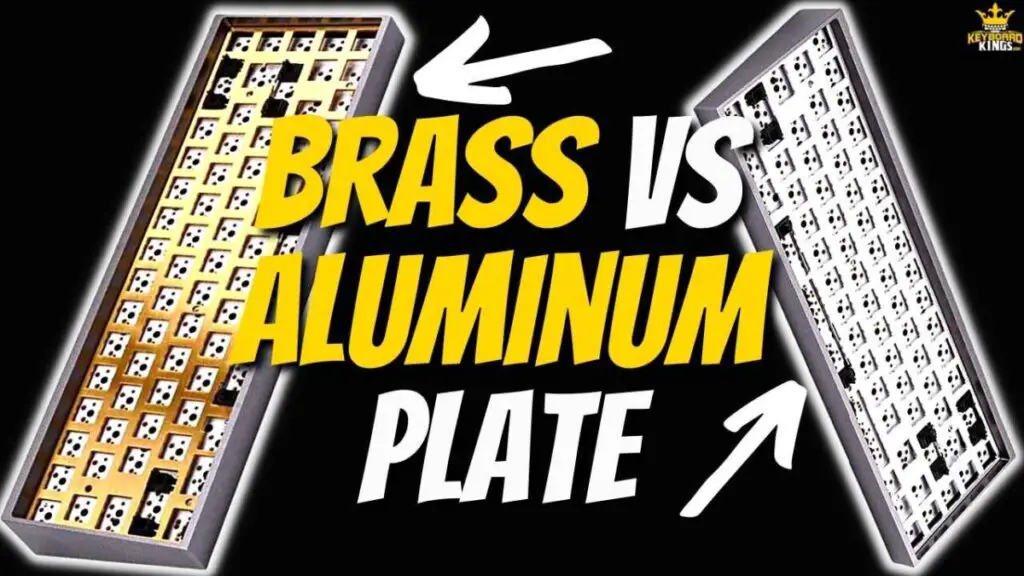When choosing a custom plate for your mechanical keyboard, there are two great options to choose from brass and aluminum. While brass plates are well known for their light and tactile feel, aluminum plates are flexible with a sharp-pitched sound. As a result, choosing the right plate is the first step in building the perfect custom keyboard.

| Brass Plate Keyboard | Aluminum Plate Keyboard | |
|---|---|---|
| Density | Denser than Aluminum | Less than Brass |
| Weight | Heavy | Lightweight |
| Cost | More Expensive | Relatively Cheaper |
| Sound | Low-pitched | High-pitched |
Table of Contents
Which is better? Brass or Aluminum Plate Keyboard
We all know that brass plates are more expensive than aluminum plates, but does that make them the best in the market? Honestly, it comes down to how you prefer your mechanical keyboard. If you want your keyboard to have a smooth feel and a low-pitched sound, then a brass plate is the way to go. Whereas an aluminum plate has a tactile feel and produces a high-pitched sound.
Aluminum plates also offer a few advantages compared to brass plates. Aluminum plates are lighter than brass plates, hence easy to carry. Aluminum plates also have a corrosion-resistant finish making them very durable. As aluminum has a low expansion point, this means that it will expand less with temperature changes as compared to brass plates.
While brass plates might have some negatives, they also offer a few perks that outshine aluminum. Brass plates are known for their smooth feel and echoing sound, while aluminum plates are much sharp with a tactile feel. Brass plates might be heavy to carry around, but that makes them more sturdy and resist signs of wear better.
While I was building my pc a couple of years ago, I was too very confused between these two. But I opted over the Brass plate as I wanted something smooth and lightweight.
Aluminum Plate Keyboard
Aluminum plates are one of the most popular plates in the market. Aluminum is a lightweight material that reduces the keyboard’s overall weight. Aluminum plates have a unique coating that reduces corrosion by a ton, making them a perfect fit for humid environments.
Aluminum plates are also available in different sizes and thicknesses, making them very versatile. Here are some of the pros and cons that you should know about aluminum plate keyboards.
Pros
- Aluminum plates are light in weight and easy to carry around.
- Aluminum plates offer a corrosion-resistant finish.
- Aluminum is a very durable material, thus making them withstand wear and tear.
- Aluminum plates are relatively cheaper than brass plates.
Cons
- Aluminum is highly conductive and can easily cause a short circuit.
- Aluminum plates might be too loud and high-pitched.
- Aluminum plates are flexible and hence less sturdy than brass plates.
Brass Plate Keyboard
Brass plates have recently become famous among many keyboard enthusiasts. Brass plate keyboards are very well known for their unique typing feel.
Brass plates are the perfect foundation for keyboard switches as they reduce key wobble. To provide you with a clearer picture, here are some of the pros and cons of brass plate keyboards.
Pros
- Brass is a dense material which makes them more durable than aluminum plates.
- Brass plates have a much softer sound than aluminum plates.
- Brass plates have a unique color which makes them visually appealing.
- Brass plates are much more scratch resistant than aluminum plates.
Cons
- Brass plates are more expensive than aluminum plates.
- Brass plate keyboards are less portable as they are heavier than aluminum plates.
- Brass plates can oxidize over time and make your keyboard look dull.
- Brass plates have high expansion point than aluminum plates.
Points To Consider If You Are Getting Confused Between Brass & Aluminum Keyboards
Sound and Feel
Switches are not the only things that make a mechanical keyboard sound and feel different from one another. Plates are the very foundation that switches are laid on that make a huge difference.
As brass plates are denser than aluminum plates, they produce a low-pitched deeper sound known for their echo and soft feel. As the aluminum plates are light, they make a much more high-pitched sound known for their clicky sound.
Portability
As the brass material is heavier than aluminum, they are more troublesome to travel with and move around while in use. As aluminum plates are lighter, they are easy to carry. Thus, aluminum plates are more portable and light in weight.
Durability
Brass plates are more durable than aluminum plates as they are more dense and sturdy. Aluminum plates are more flexible and are more prone to damage. Although, brass plates do not have a corrosion-resistance layer and thus oxidize over time.
Brass plates are more rigid than aluminum plates making them resist tear and wear better. Aluminum plates also have a layer of corrosion-resistance layer, thus making them corrode slowly.
Cost
Aluminum plates are cheaper than brass plates. Hence, making them much more cost-effective. As brass plates offer a unique experience with higher durability, which makes them worth the price difference.
Many people prefer aluminum plates as they are cost-effective. Although many keyboard enthusiasts say,” it is worth the extra $30-$50”.
Oxidation
Brass plates are not corrosion-resistant and thus produce a thin layer of oxidation over the surface. This oxidation makes them look discolored and dull. However, it is easy to clean off without damaging the keyboard. Aluminum plates have a corrosion-resistant layer which prevents any oxidized layer from developing.
Scratch Resistant
As aluminum material is much softer than brass, it is more prone to scratches. Brass is a rigid material and thus is less likely to get a scratch on its surface.
How do Brass and Aluminum Plates Interact with Different Switches?
Now we know about the individual qualities of brass and aluminum plates, so let’s talk about how they interact with different switches. As we all know, that switches are one of the most crucial factors behind the sound and feel of a keyboard.
While buying a custom plate, you should know how it interacts with different switch types. Here are some of the most popular keyboard switches and how brass and aluminum plates interact differently with them.
Clicky Switches
Any metallic plate offers a loud and clicky sound when paired with clicky switches. If you want your clicks to sound loud and crisp, then aluminum plates will do the job for you.
Aluminum plates are less dense than brass plates allowing them to produce bright and sharp sounds. Although, the clicks would feel more stable and well-rested in brass plates.
Tactile Switches
Tactile switches are well known for their feedback and are prevalent in gaming keyboards. Brass plates provide a solid and rigid foundation for tactile switches.
This solid foundation helps amplify the synaptic feedback making them a better pair for brass plates. Aluminum plates also work decently with tactile switches, as they are firm and very durable.
Linear Switches
Linear switches are one of the most common switches available in the market. They are well known for their loud sound. Both brass and aluminum plates pair up well with linear switches.
Aluminum plates are high-pitched and amplify the loud keystroke sound produced by the linear switches. Brass plates offer a little more stability but are equally loud when laid with linear switches.
Different Types of Metal Plate Keyboards
Customizing a keyboard really comes down to personal preference. There are various other metal plates that you should know about before making the final purchase. Here are some of the metal plates available in the market.
- Polycarbonate Plates – Polycarbonate plates are a great option if you want a plate that is lightweight yet durable.
- FR4 Keyboard Plate – FR4 plates are very sturdy, so it lays a great foundation for a smooth typing experience.
- ABS Keyboard Plates – ABS plates are great plastic plate that is durable and resistant to breakage.
FAQs
Q. Do brass keyboard plates oxidize?
Yes, brass keyboard plates oxidize with time. As brass plates do not have any corrosion-resistant layer, it tarnishes over time and appears dull. However, cleaning the brass plate at regular intervals will help slow down this oxidation process.
Q. What does a brass plate do for keyboards?
As brass is a denser material, it provides a sturdy and firm foundation for your custom keyboard. Brass plates also offer a low-pitched or softer sound that many people enjoy. Brass plates are less likely to develop a scratch due to their rigid material.
Conclusion
Both brass and aluminum plates are great options if you are looking forward to customizing your keyword. If you like your keyboard to have a great sound yet a smooth feel to them, then brass plates are the way to go. They are very durable and scratch-resistant, making them a premium option to choose from.
If you want an affordable plate that is a jack of all trades, aluminum plates will do the trick for you. While it is corrosion-resistant and lightweight to travel with, it lays the perfect base for your mechanical keyboard. So, leaving the final decision in your hands as to how you want your custom keyboard to sound and feel.
